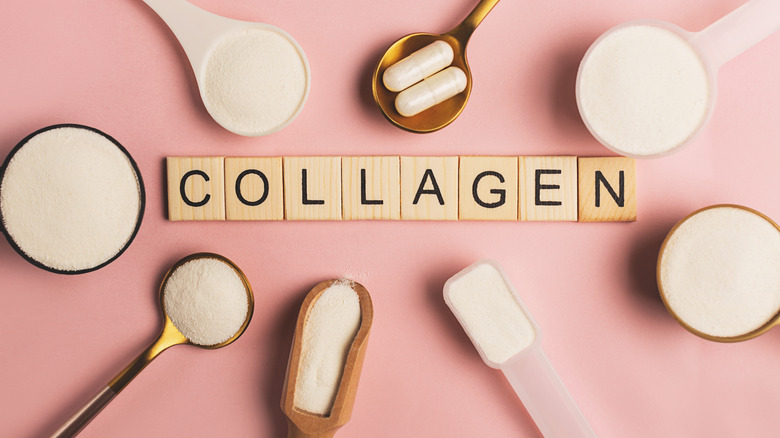Here's Why You Should Think Twice Before Adding Collagen To Your Coffee
Chances are, you've heard about the potential benefits of adding a collagen supplement to your diet. According to Healthline, collagen is the most abundant protein in your body. It plays an essential role in creating connective tissues like ligaments, tendons, muscles, and skin. While you can eat your collagen in the form of bone broth and pork skin, many people choose to take supplements, especially since they purportedly ease joint pain (via Current Medical Research and Opinion) and improve skin (via Journal of Cosmetic Dermatology).
An article in Texas A&M Today explained that collagen amino acids under the skin could help prevent it from sagging. In your 20s, your body starts producing less collagen, which is why you might feel joint pain and see sagging in your skin.
Many people choose to include a supplement to boost their collagen to help combat this natural phenomenon, hoping it helps them achieve beautiful skin. An effective way to take it is by mixing a high-quality powder in a drink. However, if you're considering adding it to your coffee, you might want to think again.
Here's how hot coffee destroys the health benefits of collagen
Brooke Russel, a scientist who studies collagen, wrote about the popular supplements for The Conversation (via Texas A&M Today). She noted that there's a good reason why you shouldn't add the powdery supplement to your coffee — the heat renders it ineffective. According to Russel's description, the structure of collagen is a lot like three ropes twisted together, and to work, the amino acids need to maintain that structure. Types I, II, and III are the ones that make up the majority of the collagen in your body, even though there are 30 types altogether.
The reason why hot coffee or tea, for that matter, renders collagen ineffective is that it melts the protein, turning it into jello, which means it won't help give you the health benefits you desire.
While collagen is typically considered safe, according to Healthline, you should ensure that any supplemental form you choose to take doesn't have any allergens in it that you've reacted to in the past. Russel points out that you can support healthy collagen production by eating leafy green vegetables, citrus, eggs, berries, tomatoes, cabbage, pumpkin seeds, avocados, and garlic (via Texas A&M Today). If you do want a supplement, however, she suggests using a refrigerated type, liquid collagen, or mixing a collagen powder into a cold drink for best results.

